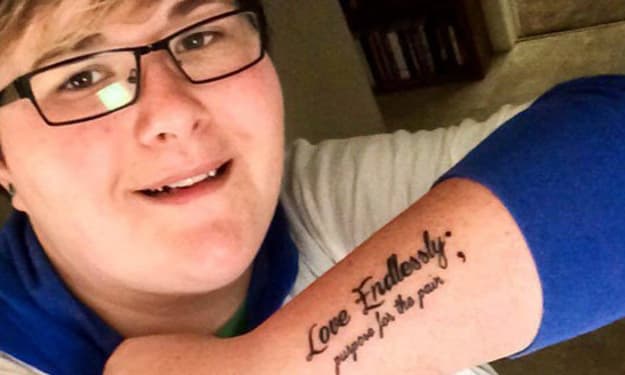My 411 About Coming Off Mental Health Medications
I'm no expert; I've just been there myself.

I started taking Effexor XR, aka venlaxafine, in the fall of 2010 after experiencing ongoing issues with what I now am able to recognize as anxiety. I was extremely functional, but my brain and my body were very overtaxed and the theoretical backpack of things that I had been dealing with over the course of several years was virtually to the point of bursting. At the time, what did I know? I was following the example I felt was set by the generation previous to mine; you soldiered on although you most definitely needed a break from the general "stuff" life had been throwing at you.
I was given these pills with no information about when might be the best time for me to take them, and with limited information about when I should start feeling better. Were it not for my amazing pharmacist, I wouldn't have had a clue as to the side effects of both going on the medication and coming off it - especially if I came off it too suddenly without weaning off. What people don't realize is that mental health medication, whether you're talking about Cymbalta, Effexor, Celexa or Zoloft, is that these are very different meds than your doctor might give you for the physical aches, pains and illnesses that we go through during the course of our lives.
SSRI, NDRI And SNRI (And MAOI) - Oh My!
Selective Serotonin Reuptake Inhibitors (SSRI), Norepinephrine and Dopamine Reuptake Inhibitors, Serotonin-Norepinephrine Reuptake Inhibitors (SNRI) and Monoamine Oxidase Inhibitors (MAOI) are all different types of anti-depressants and anti-anxiety medications. MAOI were like the original iPhone - first generation - but have since been replaced with SSRI and SNRI as the go-to medications for those who deal with anxiety or depression.
It was realized that MAOIs helped prevent the removal of serotonin, dopamine and norepinephrine from your system, which helped effect changes in cells affected by depression. They now tend to be used to help treat symptoms from Parkinson's Disease.
NDRIs, SSRIs and SNRIs are a little more targeted and have fewer side effects, but all effect how our bodies reabsorb these chemicals called neurotransmitters, and serotonin, norepinephrine, and dopamine fall into this category. It's believed that how these are absorbed - or at the very least, what levels you have of these neurotransmitters - can affect mood and potentially lead to conditions like anxiety and depression. However, because these categories of drugs affect more than just your brain - they affect neurochemistry - there's a whole load of symptoms that can occur when you stop cold turkey. You might see some digestive issues in addition to your head just feeling as though you were put through the wringer.
Dangers of (Cold) Turkey
Your pharmacist will generally tell you to take the full dose of any medication he or she gives you; for instance, if you have an infection of some sort, you'll be given 10 days' worth of medication and told to take the whole lot to avoid any sort of worsening symptoms.
Anti-anxiety meds or anti-depressants don't quite work like that. Because everyone's neurochemistry is a bit different, it sometimes takes some time - weeks or months - to figure out the ideal dose so you actually feel better. Your neurochemical imbalance is slowly being evened out, and that can't be done overnight - and if and when there comes a time to come off the medication, you can't just stop overnight.
You also can't just skip a dose or two, not without your body feeling what can be terrible side effects. In taking an SNRI like Effexor XR, I learned that missing even one dose could lead to me feeling as though I was hung over or flu-ish. I didn't get the "brain zaps" as some people have described, but I was feeling yucky enough that I was wary about going cold turkey. My pharmacist and my nursing friends had also cautioned me about cutting off the drug suddenly, so that was enough.
When it came time for a decision about staying on Effexor XR or trying another SNRI or switching to an NDRI or an SSRI, it was because it was believed that the medication was actually causing sleep disturbances that I'd been experiencing for three to four years. This disturbances had actually resulted in me averaging three and a half to four hours of sleep nightly for ages. The nurse practitioner I'd seen suggested that it could be the Effexor causing my sleep issue, so we agreed - me somewhat more reluctantly than she - I should wean off, with the intent that I try something different, medication wise.
I'd been taking Effexor for six years, and I weaned off in about four weeks. I was incredibly lucky; most of the symptoms I'd expected during the weaning process just never occurred. It wasn't until I made the jump from 75 mg daily to nothing that things got bad. Whether it was feeling as though I had low-level electricity going through me, or nausea, or just a sense of sensory overload, which can also be a withdrawal symptom, the first week in particular was brutal.
Navigating Life
I have no idea whether or not I'll go back on another sort of anti-anxiety medication. Right now, I'm trying to play the game of life without, and I'm realizing just how hard that can be at times without other coping mechanisms in place like exercising. I'm trying to breathe more deliberately, without feeling as though everything is trapped at chest level.
You'll find that in talking with anyone dealing with issues like anxiety and depression, they might have similar sensations. They may have considered stopping whatever medications they might be taking, with the people in their lives struggling to understand what they are going through. They may have stopped their medication cold turkey and might be wondering why they are once again emotionally all over the map, or might be shorter-tempered than usual.
They might need help navigating life, reminders that things eventually get better. They don't need questions like "why do you need medicine to feel better?" or anything like that. If nothing else, people dealing with mental health issues need support and reminders that trying to heal from mental health challenges is a little different than healing from physical impairments.
This is a lifelong struggle for those with any sort of mental health difficulties, and people need to realize that medication can't simply be stopped or that people can simply just immediately be relaxed or happy. There's always hope, and part of that comes with an attempt to understand each other. Cutting mental health medication is a long, difficult process that may or may not be successful, but it's important to know that it's still okay to take the medication if that's what's needed.
About the Creator
Christina St-Jean
I'm a high school English and French teacher who trains in the martial arts and works towards continuous self-improvement.






Comments
There are no comments for this story
Be the first to respond and start the conversation.